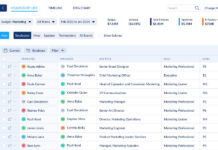
The sheer number of options available has made sourcing and purchasing HCM technology a more daunting challenge than buyers have ever faced. Some sources say the number of HR tech startups at work is around 135, though we’ve heard others put it closer to 400. VentureBeat reports the HR technology market is worth about $400 billion, and established players continue to grow even when they’re not acquiring competitors.
 Exciting as this might be to those on the investment and vendor side, the variety of choices available can overwhelm customers as they evaluate solutions and attempt due diligence. As a result, vendors must be clear about the value their solutions offers. Otherwise, buyers face added risk when it comes to making the right decision.
Exciting as this might be to those on the investment and vendor side, the variety of choices available can overwhelm customers as they evaluate solutions and attempt due diligence. As a result, vendors must be clear about the value their solutions offers. Otherwise, buyers face added risk when it comes to making the right decision.
As Janine N. Truitt, chief innovations officer of Talent Think Innovations, observed: “For the average buyer, ”more” isn’t necessarily better as they often don’t have a concrete way of deciding what is important in their next technology acquisition and what is not.”
Truitt’s words appear in Empowered Decision-Making for Purchasing HR Technology, a white paper she wrote for Ultimate Software. In it, she tackles two dimensions of the HCM technology market that don’t get nearly enough attention: First, the quickly growing range of available products makes the landscape more difficult for buyers to navigate. Second, the industry is far, far ahead of the HR practitioners it serves.
That’s especially true when technologies like big data, machine learning, AI, and the Internet of Things are driving the development of advanced solutions by a growing number of companies. These products have expanded well beyond applicant tracking systems and Core HR solutions. Vendors now offer tools to address areas such as wellness, benefits administration, talent management, team collaboration and workforce management.
Aligning the Short and Long Terms
As an example, Truitt observes that SHRM”s 2018 top trends in HR technology were Blockchain, AI, intelligent apps and analytics, the Internet of Things and conversational platforms. While a number of enterprise HR IT leaders are indeed well-versed in these technologies, Truitt’s point that HR tech vendors are “focused on Robotics Process Automation, while a substantial portion of their market is still stuck in executing basic process automation,” rings true.
In a nutshell, Truitt suggests, “There is some dissonance” between vendors (and the analysts who cheer them on) and the needs of HR practitioners who actually use their products. She’s backed up by a recent report from Sierra Cedar, which found most organizations don’t plan to adopt technology like benchmarking databases, wearables, the IoT or machine learning in the near future.
Bridging this gap requires HR to step up. In terms of technology, the challenge it faces is about evolution and adaptation. Rather than scramble to keep up, Truitt says, HR needs to drive its own technology change. Like many other business functions, it “has to evolve at a rate that presents some difficulty and discomfort,” especially since changing or even abandoning familiar processes in favor of new approaches is a real possibility. “It’s time to get comfortable with the uncomfortable,” she said.
While that’s often easier said than done, it’s possible to do when buyers take a breath and organize. Educated customers who can articulate their needs, thoroughly research the tools that can meet them and understand the impact a new solution can have on both the workforce and the business as a whole have, to use Truitt’s word, “empowered” themselves with clarity. The result of their organization and research will “act as an anchor” that not only helps them through the HCM technology purchasing process, but provides a roadmap how new technology will be used and who will be responsible for making things happen.
You can download the white paper here.















